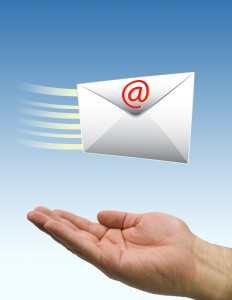I hope you find my writing and business tips and observations useful. My business and blog are dedicated to helping businesses communicate clearly and reach their potential.
Read, subscribe to my newsletter, enjoy!Tash
Email content is factual
Over the weekend I attended the second weekend of a training course. One session was on communications as part of relationships, and the instructor said something that stuck in my mind.
He said “emails are for facts, never emotions”.
[Tweet “Emails are for facts, never emotions”]
So, you can write an email “We will meet at 5 pm” or “Please write me a promotional article on woggles.” And it is ok to write something like “I am upset – can we please talk about it?”
No emotions in emails?
I had never thought of it quite that way, but it is a good point. What you write can be misinterpreted, especially when emotions are involved, which can cause more problems than you already have. It is also harder to write clearly when you are feeling emotional so you are more likely to be negative than constructive.
If there is an issue to resolve, it is much better to deal with it face to face or via the phone than in an email. For one thing, tone of voice can impact on the understanding of the message and for another, it is more immediate – there can be delays in replying to each other via emails and that can also add to confusion, misunderstandings and problems.
And don’t think this is just referring to personal relationships. If there is an issue between you and a supplier or customer, grab the phone or arrange a meeting and get the issue resolved.
For a business situation, it isn’t just a matter of smoothing relationships either – it is your business’ reputation and having emotions in writing can be used out of context to your detriment.
So a simple rule to add to your business model – keep emails for facts, not emotions!
Use your words wisely.
*Image courtesy of Frugo at 123rf
Repeat email ads not so good …
If you send out announcements or ads to a mailing list, be careful not to overdo it. I recently received two emails only days apart from the same person for the same ad, although she tried to make it look like two ads – it didn’t impress me as I wasn’t interested in it the first time!
Using a different example, the first message she sent was “Tash is presenting a workshop on clear communications in Mulgrave”; the second message was “Learn about clear communications in our workshop”
I think it is insulting to your readers to assume they can’t tell that this is the same ad in different words – and how embarrassing would it be for someone who tried enrolling in ‘both’ seminars?
If for some reason you are going to repeat an ad to your mailing list, then be honest about it and say so. Some possible introductions are:
- Apparently some people didn’t get this message so I am sending it again
- I had to send this again as the date has changed to …
- Apologies for sending this again, but I felt it was so important I didn’t want to risk you missing out
- I’m sorry – I sent this to you yesterday but I forgot to add the link so you could book!
However, make sure it is an honest reason you give and don’t do it regularly as it looses any credibility it may have had. I have received emails from people who used the ‘sorry, wrong/forgotten link’ more than once in two months and it looked very tacky and led me straight to the unsubscribe button.
If you are sending an email about somethig with a specific date, such as a workshop, then you can send a reminder closer to the date – note, it should be a reminder not just the same message again. And again, don’t send lots of reminders as that is just as annoying as repeated ads and also makes it less likely that the reader will respond to any of them.
Use your words wisely!
P.S. I am actually giving a workshop on clear communications in Mulgrave on Monday, 26th May. If you can make it, please make sure you introduce yourself to me on the day.
Complaints response
I have often used bad examples of writing, so I thought it was time I acknowledged receiving a good email!
A little while ago, I noticed a discrepancy between an invoice and my bank statement so I sent a polite email to the supplier. I noted the problem and the resolution I wanted. The supplier replied to me email and I was impressed by the response.
The email was:
Hello Tash,
Thank you for your email. I understand you are concerned that, {stated my issue in their words}. I see that you would like {repeated my requested resolution}. Below, I have addressed your concern in detail.
And then went onto to answer my concern.
The email is polite and clearly shows they have read my complaint and are treating it seriously and respectfully. It started with my name and was obviously written by a real person in answer to my email – not just a standard response.
In fact, I think it makes a pretty good template for how to construct a complaint response! As a customer, I felt heard and respected, and my issue was dealt with.
So next time you have to answer a customer complaint, or even a customer query, remember the steps:
- use the person’s name
- restate their issue to show you are listening (or reading!)
- restate any resolutions they suggest
- answer the issue
- above all else, be polite and respectful
Happy writing!
Know who you are emailing
 Writing an email (or letter) request may seem very simple, but it needs care and attention to get it right. A poorly written request is much less likely to get the results you want so the effort is worthwhile.
Writing an email (or letter) request may seem very simple, but it needs care and attention to get it right. A poorly written request is much less likely to get the results you want so the effort is worthwhile.
Probably the main thing is to do some research beforehand so that you know who you are writing to. This includes using the name of the person, and probably even their business. By knowing a bit about the person/business, you can save yourself from looking ignorant.
For example, many website owners receive emails saying something like “We would like to have a link to our website from yours and we will then add a link to your site on [our site]” However, they ignore the fact that the site only takes paid listings or does not have a links page.
Sometimes, these emails go further by asking for additional promotional activities from the business owner – again, not noticing whether these details are listed on the site or if the site even offers any sort of promotion to others.
The end result? The website owners disregard the email and the sender does not get any new links to their site.
And frankly, for the best results in a search engine, you should be selective about who you link with, rather than sending a standard email to every site you can think of in hope that some will accept your offer. But search engine rankings is a whole other subject!
Once you know a bit about the person/business you are writing to, you can aim the email directly to them.
To use the same example, asking for a website link exchange, a better request could be “We see you have a links page on your website. If you would like the benefits of another link to your site, we would like to suggest a link exchange.”
If you are writing a request email/letter, my tips on how to encourage someone to do something may also help.
* Image courtesy of 123RFPolite emails
![]() Writing an email is so quick and easy that sometimes we forget it is in writing and still reflects on how we are perceived.
Writing an email is so quick and easy that sometimes we forget it is in writing and still reflects on how we are perceived.
For starters, emails should be just as polite as letter or face-to-face contact. Apart from being likely to get a positive response to good manners, it is simply a sign of respect and professionalism.
I recently received an email from someone who runs a network which I don’t participate in. The second paragraph started with “If you are not a fan of using Forums, perhaps now is a good time to change your attitude.”
It didn’t help that there was no greeting to start the email (It opened with “Just a reminder to go to the Forum”)
I found this quite rude and it actually made me less likely to join her forums in case that is how I would be treated there as well. She made no allowance for people being busy, having concerns over online security* or not knowing how to use a forum – she just assumed I have a bad attitude and that I should change it to suit her.
So how do you keep an email polite?
start with a greeting, and preferably use the person’s name
use words like please and thank you
don’t insult people – if you must say something negative, put it in positive or constructive terms
be brief so you don’t waste their time
use proper sentences so it is easy to understand and you look intelligent and literate
treat the reader with respect – if you wouldn’t say it to their face, it isn’t appropriate to write it either
* Her email mentions that non-members can read the posts so I would have concerns about the security of the site.


Recent Comments